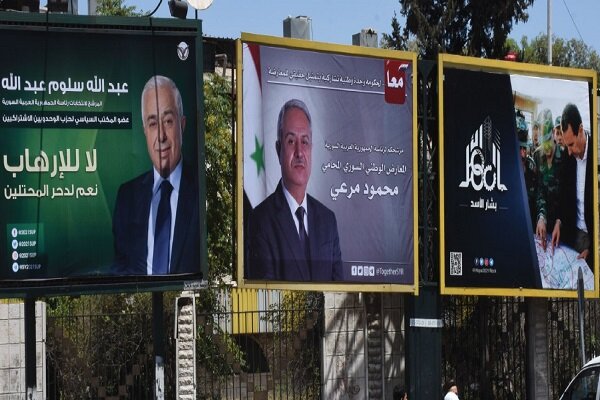The Syrian Presidential Election is set to be held on May 25 across all Syrian areas, except for those that are being controlled by terrorist groups.
Since 2014, this is the second presidential election in Syria, however, it will be held under different conditions. Despite all the pressures to discredit the upcoming election, imply it as insignificant, and cast doubt on its outcome and process, it should be noted that the type and manner of holding this election is, on its own, a new event in the Arab political culture.
Despite all the pressures to discredit the upcoming election, imply it as insignificant, and cast doubt on its outcome and process, it should be noted that the type and manner of holding this election is, on its own, a new event in the Arab political culture.
This is while most Arab countries are unfamiliar with the term “ballot box” or at least the output of their elections have been the approval of one candidate based on political and social coercion.
Western countries are questioning the Syrian election while they recognize the structure of the Arab emirates and the Kingdom of Saudi Arabia as a natural right. They not only remain silent against Arab regimes’ suppression of basic definitions of democracy but also express their explicit support of the regimes.
At least the basic standards of an election, under Western countries’ definition, can be seen in the Syrian case today.
Perhaps this is the first time in the history and culture of Arab politics and even Syria that candidates other than the incumbent president have been nominated. However, the very same issue has been turned into a source of pressure on Damascus as every effort is being made to imply that these candidates are just for show!

The presence of the Syrian people in the election campaigns in Damascus and all the Syrian cities has given a different look to the war-hit country; a country that still bears the consequences of destruction and war while also being severely impacted by Caesar Law.
It seems that Syrian citizens have a good and appropriate understanding of regional developments and scenarios that were being carried out against their country one after another.
Certainly, some of those that will participate in the election are those who assumed that a reformist movement had started when activities of terrorist groups initiated in the country.
It seems that Syrian citizens have a good and appropriate understanding of regional developments and scenarios that were being carried out against their country one after another.
Syrians and Iraqis have felt and understood better than any other nation the savagery and insecurity of the suicide bombing, which is a combination of Wahhabi and Takfiri ideology with US political and financial support. Now, the efforts are focused to hinder a peaceful and democratic process to pave the ground for ISIL’s return.
But an important point to consider is that not only the type and characteristics of this election in Syria is different but also it has coincided with some developments in the region.
In particular, the goal of terrorism in Syria was to undermine one of the most important countries of the Resistance Axis.
Developments over the past few months in the geographical area of Resistance have been such that some would make miscalculations. Similar to those miscalculations that were being made at the start of wars in Yemen and Syria; hasty views that assumed Syria would fall in the early weeks and that Yemen would be destroyed in the first week.
Trump's political approach towards regional policies, especially on the occupied Palestinian territories that were being pursued at a high speed, led to a strategic mistake by America’s friends in the region who thought everything was finished.
Hence, some of these Arab countries put all their eggs in Trump's basket and even distanced themselves from the American political structure and other parties.

Thus, it can be said that the holding of elections in Syria, which was the main target of US and the Zionist regime as a center of Resistance, along with unique field developments – that came after all the efforts of Trump to create despair among the Arab and Muslim countries – signals a revival of resistance in the political arena. Today, one can say that the initiative of both and the field and politics is in the hands of the Resistance.
Trump sought to use the normalization of Arab-Israeli ties – or better said formalizing such ties – and other plans such as the so-called Deal of the Century and embassy relocation as a card both for himself in the US election and for Netanyahu, however developments proved otherwise.
These developments and the lack of a serious reaction to them led to some regional events causing some to believe that the Palestinian cause and in general the complementary circle of Resistance, are gone forever.
But in recent days, something important has happened that can be described as a new chapter in the history of the Resistance, a chapter that will be recognized as a complementary point in the different geography of Palestine and the Resistance, and the beginning of the disintegration of Zionist society.
Thus, it can be said that the holding of elections in Syria, which was the main target of US and the Zionist regime as a center of Resistance, along with unique field developments – that came after all the efforts of Trump to create despair among the Arab and Muslim countries – signals a revival of resistance in the political arena. Today, one can say that the initiative of both the field and politics is in the hands of the Resistance.
Reporting by Mehdi Azizi

























Your Comment